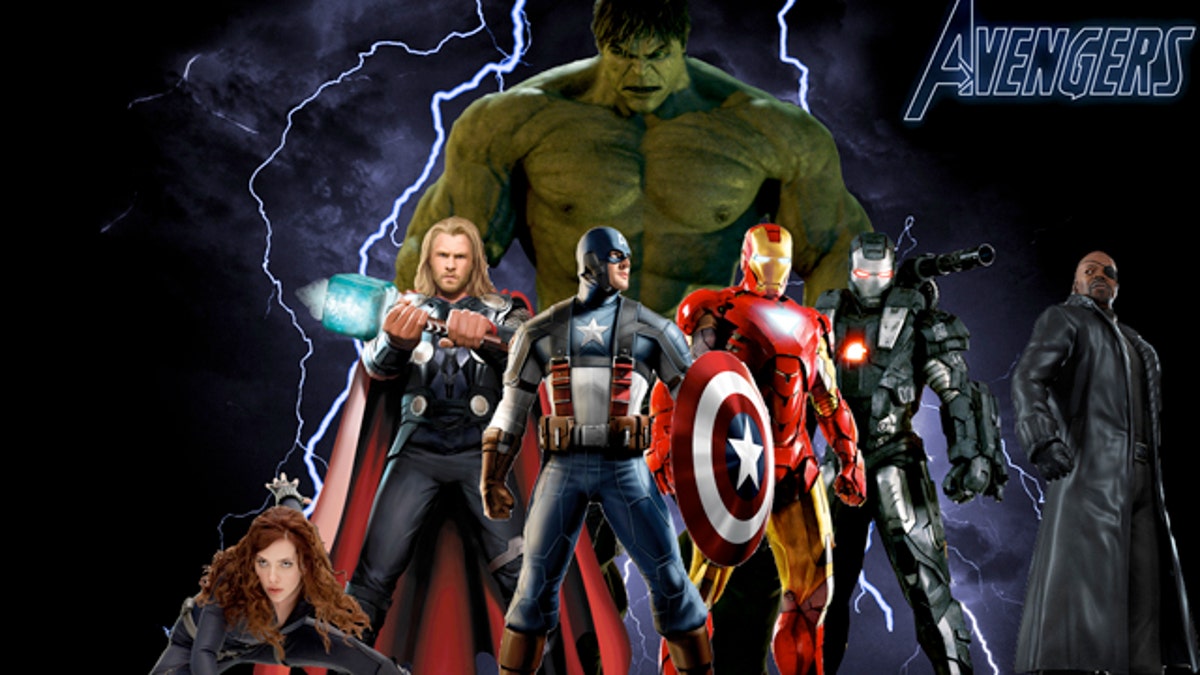
A poster advertising the forthcoming film "The Avengers," which tells the story of "a group of remarkable people" gathered to help save the planet. But are those "people" human? (Walt Disney Pictures)
The forthcoming Avengers movie, directed by Joss Whedon and expected May 4 from Walt Disney Pictures, depicts the Marvel superhero group teaming up to save the Earth from utter destruction.
Saving the world is ordinary fare for superheroes, especially teams like the Avengers and the X-Men. But one of the biggest battles ever fought in the Marvel universe took place in the real world, a historic fight that lasted 10 years and crossed America.
The clash ended quietly in 2003, with a monumental, six-figure legal ruling by the U.S. government: The X-Men and many other superheroes simply aren’t human.
Or more precisely, they’re not dolls, which, according to the U.S. Customs Bureau, represent “only human beings.” They’re toys, which represent “animals or non-human creatures.”
What’s the difference? Gazillions of dollars.
The U.S. government waded into the “mutant or mortal” battle 19 years ago at ports in Los Angeles and Seattle after Customs officials there classified several large shipments of action figures, including the X-Men, as “dolls” instead of “toys.”
But labeling the figures as “dolls” made importing the X-Men nearly twice as expensive as they would have been as “toys,” facing a 12 percent tax rather than a 6.8 percent tax.
High taxes make Hulk angry -- and you wouldn’t like Hulk when he gets angry.
Recognizing the difference between toys and dolls, international trade lawyers Sherry Singer and Indie Singh saw an opportunity to save Marvel a lot of money by getting the X-Men, along with Marvel’s other action figures, including the Hulk, Spider-Man, and Iron Man, reclassified as toys.
"Humans have eyes, and ears, and mouths, and noses, and legs, and arms,” Singer explained to FoxNews.com. “It was other features these figures had that, we believe, made them non-human.”
Singer lists the Beast’s blue fur, Wolverine's claws, and Dr. Octopus’s tentacles, along with the whole superpowers thing, as such features -- disqualifying the characters from the realm of humanity in federal eyes. And after a protracted battle, the United States Court of International Trade agreed.
“Whatever the degree is to which they resemble human beings, the court finds that these action figures do not represent human beings …These fabulous characters use their extraordinary and unnatural physical and psychic powers on the side of either good or evil,” reads the court’s decision.
The government had sympathized with the plight of the X-Men for years, calling them humans -- and therefore dolls, said Joe Liebman, the former lead attorney in the case for the U.S Department of Justice.
"The government’s position was that the essential nature of these figures and the characters that they represented in the story … were essentially human despite the presence of these additional features or abilities,” Liebman told FoxNews.com.
To reduce the import tax, Singer and Singh needed to convince the government that the X-Men and their superhero friends were, in fact, not human.
And that meant all of them -- even the weird blue one and the guy with the laser beam eyes.
"The case was very complicated because there were many, many figures -- literally dozens of figures,” Singer told FoxNews.com.
Armed with more than 60 different action figures, the lawyers headed to U.S. Customs headquarters in Washington D.C. One by one they explained to the court why each of the X-Men and superheroes did not meet the qualifications to be considered human.
It was hard, because not all of the X-Men have obviously inhuman traits. Professor Charles Xavier, Cyclops, and Storm are several who seemed to be human in nearly every aspect to Liebman.
"We focused on the fact that regardless of the mutations that occurred, these characters all had human characteristics, both in terms of their physical appearance, and their mental and emotional existence,” Liebman said.
In the end, the decisive blow in the battle for mutant equality was a single word in the definition of “dolls.”
“It said dolls representing ONLY human beings,” Singer explained. “It doesn’t say resemble a human being, it says represent ONLY a human being.”
The judge found that the X-Men and other superheroes’ abilities made them more than mere mortals, and thus they could not be classified as humans, as stated in the court’s decision:
“They are more than (or different than) humans … a 'mutant' is someone with an extraordinary appearance or abilities, such as the figures at issue here.”
And with that, the war was over. The X-Men, Spider-Man, Iron Man and Hulk were exiled from the human, or “dolls,” world of tariff classifications, and officially declared by the U.S. government as non-human “toys.”
The banished superheroes can take solace in knowing that even as non-humans, there is still hope for acceptance.
Oh, I still like Storm. She’s hot,” Liebman said with a smile.
